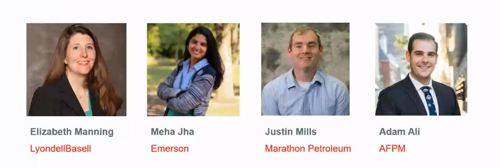2021 AFPM Summit Virtual Edition: Emerging leaders build skillsets and competencies, look for opportunities to learn
MIKE RHODES, Managing Editor, Hydrocarbon Processing
Tuesday afternoon at the AFPM Summit featured a virtual, live chat panel titled, “Career Perspectives from Emerging Leaders.”
The panel was moderated by Adam Ali, Manager, Technical & Workforce Development, AFPM, and featured Meha Jha, Emerson; Liz Manning, LyondellBasell; and Justin Mills, Marathon Petroleum Corporation.
The audience ranged from those new to the industry to multi-decade veterans and posed many insightful questions that sparked an open, wide-ranging discussion. Companies represented by the audience included Athlon, Honeywell, Big West Oil, SUEZ, LyondellBasell, ExxonMobil, Phillips 66, Honeywell UOP, Marathon Petroleum and BASF, among others.
“When it comes to emerging leaders and progressing through your careers, it helps to hear from people that have been in the industry for some time and served in different roles and positions—what was the one thing you wished you knew when you were beginning your careers?” Ali asked the panel.
Manning said, “There are a lot of things I wish I knew. I’ve learned a lot over the years. The thing that jumped out at me was approaching career experiences as learning opportunities. The academic environment can be very linear—progressing up and on. I think there is so much to learn in our industry. When I figured out that I could learn from every experience, whether it was something I chose to do or a side-step, that was a really beneficial thing.”
“I think a key is working throughout the value chain and realizing how transferable your skills are,” Jha said. “Sometimes we get siloed in our thinking, and we need to broaden our perspective to discover the different opportunities that we can grow into.”
Ali added, “I think tact and communication are very important—the way you are presenting ideas. When I was younger in my career I would just bring things up and they would get shot down. I was continually frustrated, which goes to the point (raised by the audience) of when you leave a position or company. There may be a cultural misfit.”

The live chat panel featured Elizabeth Manning, LyondellBasell; Meha Jha, Emerson; and Justin Mills, Marathon Petroleum; and was moderated by Adam Ali, AFPM.
In response to a question concerning 21st-century skillsets, Manning said, “I generation ago it was all about having the knowledge, and now it’s more about being able to find or access that knowledge quickly. Our industry is a balance, and it’s important to have a technical knowledge base.”
Addressing audience questions about leadership, Mills stated, “I see that people can get caught up in their title, thinking that they need ‘supervisor’ or ‘manager’ in their title to effect change or be a leader. One way to do that is to get out there and make suggestions or changes where you or see the need. Don’t be afraid to be a leader without the title.”
“I got some advice that whatever role you’re in, become an expert in that role,” Manning agreed, “and really learn it—be the best you can be within that role. Get outside your box and learn from the people around you. If you see a gap, fill it. Don’t wait for something to be assigned to you. That’s leadership. This builds your personal skillset and competencies, which sets you up for future roles.”
The discussion turned to the challenges of young engineers wanting to jump from job to job. “I’ve heard it said that people leave managers and not companies, “Ali said. “As a manager, I’ve realized that there are three categories that lead people to leave a position: (1) a lack of connection to a larger purpose, (2) younger people enjoy the use of the latest technology, and (3) maintaining an investment with your people’s skills and abilities.”
“The learning agility is a lot quicker for this generation. There is a tradeoff in investing in people that might leave,” Jha said. “There is usually some adjustment that can be made to expand someone’s role so they still feel like they are growing and learning.”
As to the right time to move on to a new role, Jha said, “I feel like I’ve hit that 80% threshold of learning what I could and anything would be a minor improvement, or I’ve left the role better than when I got there, or I see the company’s strategy changing.”
Manning said, “In five years, am I going to be able to look back and speak intelligently about what I did? Sometimes we can move fast, check the box and move on. What’s your long-term ambition? Are you going for breadth or depth? Life outside of work matters and influences your decisions. It’s a very personal thing.”
The AFPM Summit continues through Wednesday. To access news and editorial from the AFPM Summit, visit the Conference News tab on the homepage of www.HydrocarbonProcessing.com.






Comments